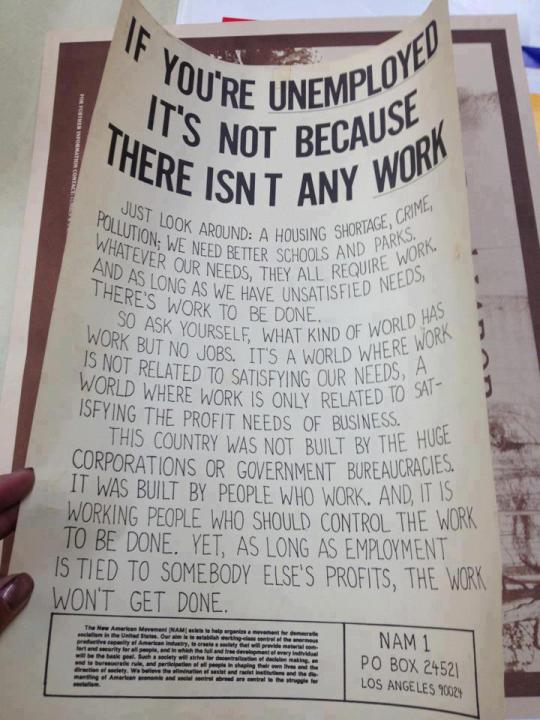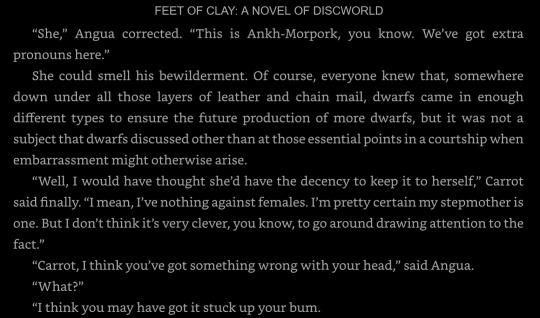Text
The way Terry Pratchett handled police in the Discworld continues to be one of the many, many things I love about his works. I certainly don’t have time to describe all the details of why he wrote such good policing, but I think the best summation of it is the arc that Sam Vimes had in many of the books.
I haven’t read all the watch books, but in the ones I have, there’s often a similar plot structure. We meet a truly detestable criminal Vimes is chasing down (think the Deep Downers in Thud, or Carcer in Night Watch). They show themselves to be truly awful people who do awful things, and they’re also just plain jackasses. They’re characters you hate to read about, the grind the audience’s gears. They also grind Sam Vimes’s gears.
Throughout the story, they commit more and more crimes. Horrible crimes, like torturing and killing innocent people, or practicing violent religious extremism. They do things that personally target our protagonist, like go after his wife and son, or relentlessly taunt him and try to kill him and his past self. They consistently do bad things, and even as Vimes is chasing them, they do more bad things. You want them to be punished.
Finally, at the climax, we get some sort of final confrontation between the villain(s) and Vimes. In a different book, Vimes might kill the people who sent people to hurt his infant son, or tortured and killed innocent people, and the audience would probably cheer. In fact, Vimes wants to kill them.
But he doesn’t. Every time, he suppresses the urge to enact his own justice, and he doesn’t kill them. He arrests them. Because, as he says many times, if you’ll do something for a good reason, you’ll do it for a bad. Even when there’s every excuse as to why this particular villain doesn’t deserve to live, he just arrests them. It’s not his job to decide how they should be punished for their crimes.
I think this is a masterful takedown of police brutality and Punisher style characters. Vimes isn’t a perfect person, it’s not that he could never dream of killing the bad guy. He can, and he does, often. But he never follows through, he understands why he can’t do that, so no matter how tempting it is, he doesn’t.
Because in this story, the hard boiled cynical cop truly believes in following the law. The message is always that law enforcement killing a criminal is never ok, even if they’re undeniably guilty of something truly dreadful. Hell, police brutality is personified as a millennia old demonic quasi-deity possessing Vimes, one that’s never been beaten before, but he beats it and doesn’t give in. I think that’s a really unique message in cop stories, and another reason as to why Pratchett was such a good author.
4K notes
·
View notes
Text
I wrote an essay about the importance of rage, kindess (as opposed to niceness), and justice as highlighted in Pratchett's work, and posted it in a group of Pratchett fans on Facebook. It went like this:
This one [is directly relevant to Pratchett and his work] and covers: Anger and Kindness, among other things.
It's taken me a while to work it out, but one of the reasons why I still engage so strongly with Pratchett's work is because of these two themes running through the thoughts and actions of pretty much every main character to whose point of view we get to bear direct witness. That, and the notion of Justice as opposed to Mercy.
Pratchett's main characters are almost all angry, often as a ground state of being - Granny Weatherwax and Commander Vimes springing immediately to mind. Polly Petks (and, to be fair, pretty much everyone except perhaps Lieutenant Blouse in Monstrous Regiment), Archchancellor Ridcully, The Patrician, Susan Sto Helit, Esk, Glenda Sugarbean, Agnes/ Perdita Nitt, Angua von Uberwald, and Tiffany Aching, to name a few more, are people to whom rage comes easily, and is a motivating force. Even those who are seen as generally more easygoing or placid of temperament have illuminating moments of anger which tip them over the edge to somewhere inspired, and that click of fully engaged rage is often a pivotal moment (for a near perfect example: Magrat's core is revealed to be sheer, molten ire when her personality is ablated by the Faerie Queen).
That's not to say that inchoate choler is venerated - the malicious, bubbling spite of Corporal Strappi is vilified as destructive, and the ever-seething, undirected bile of Mister Tulip is likewise outlined as useless because he is unable to focus it himself (hence depending on Mr. Pin's guidance).
Which brings us to kindness. Pratchett's heroes have all realised, at some level or other, that anger is a force that can - and should - be used for good. Weatherwax and Vimes, in particular, are constantly vigilant against the darkness inherent inside themselves which could snap at any moment under the weight of a wicked world and set it alight for a better one to be rebuilt from the ashes. They know that they shouldn't (it's pretty much treating people as things, after all), but that's ever constant. That's not to say, however, that the anger is never shown, utilised openly, or acknowledged by those around them. Vimes and Granny have both owed their survival against powerful, wicked creatures to rage's primal surge, but also to the enormous, almost terrifying love they bear the world.
Granny tells us that kind is not the same as nice. Nice is pretty, petty, and a lie. Nice is slapping an attractive plaster over a wound without cleaning it properly first, or dealing with the thing that caused the injury in the first place. Nice paints a gloss over injustice and asks us all to be quiet for the sake of those for whom the world works just as it should. Nice is self-delusion, and a wilful one at that. Which isn't to say that we should never indulge in a little of that - peel every cover off the world and it's too much, too raw, all at once, and we all need our masks in this world of fake it til you make it - but the Turtle cannot move if it never acknowledges the epic tides against which it must strive, and the Turtle Moves. It must.
Because justice moved Pratchett and, through him, all his finest creations. His villains were remarkable for their ability to subvert justice, to delude - themselves and/ or others - and to take and take for the sake of sometimes strange, but, all too often, all-too relatable motives. Money, power, comfort and, above all: control. And his heroes were glorious for their ability to see past the smoke and mirrors, the age-old inequities held up as a normalcy that must be protected at all costs, and tear through unjust conventions to make the necessary changes for everyone to step that bit closer to being truly free, with all its inherent terrors and responsibilities.
Pratchett wasn't nice, or whimsical - he was angry and (increasingly explicitly) vocal about justice in his works. And none of his heroes - our heroes - are either. They are kind, they serve justice, and they kick arse on behalf of those with less power, but they are neither nice, nor insipid, nor silent. And neither should we be.
Change is uncomfortable. Change feels like a death, which is why, no matter how positive the shift, we all move through the grief cycle of denial, anger, bargaining, depression, and finally acceptance and exploration. True bravery is being afraid of the pain of righteous change, of letting go of who we were, of bidding farewell… and doing it anyway.
Be brave, [Pratchett Fans]. Be bold and angry and loud about justice, and strive for true equity.
The Turtle Moves. And so should you.
4K notes
·
View notes
Text
Whenever I take a long car ride I end up exhausted afterwards, and I'm always like "why am I so tired? I was just sitting around doing nothing all day."
But the answer, it turns out, is I was doing something. Riding in a car jars your body in many directions and requires constant microadjustments of your muscles just to stay in place and hold your normal posture. Because you're inside the car, inside the situation, it's easy not to notice all the extra work you're doing just to maintain the status quo.
There's all sorts of work that we think of as "free" that require spending energy: concentrating, making decisions, managing anxiety, maintaining hypervigilance in an unfriendly environment, dealing with stereotype threat, processing a lot of sensory input, repairing skin cells damaged by sun exposure, trying to stay warm in a cold room.
The next time you think you're tired from "nothing", consider instead that you're probably in situation where you're doing a lot of unnoticed extra work just to stay in place.
113K notes
·
View notes
Text
genuinely cant stop thinking about whatever early human first looked a literal wolf full in the face and thought domestication would be fun but ALSO cant stop thinking about the ENTIRE early human tribe that absolutely did NOT think to stop them
110K notes
·
View notes
Text
Thematically speaking, the most important thing Terry Pratchett taught me was the concept of militant decency. The idea that you can look at the world and its flaws and its injustices and its cruelties and get deeply, intensely angry, and that you can turn that into energy for doing the right thing and making the world a better place. He taught me that the anger itself is not the part I should be fighting. Nobody in my life ever said that before.
64K notes
·
View notes
Text
Terry Pratchett will write books about how powerful is never to be trusted; that the elites will turn us against each other for their own interests; about death and grief and hopelessness; how people are vile creatures capable of saintly acts of good and beauty; about prejudice and classism; and all of it tied in a beautiful, growing and changing world and aren't we so goddamn lucky to have this fucking world to be in.
And then sometimes the madlad will call up Niel Gaiman and be like "Hey what if a wizard went to Australia? Wouldn't that be wacky? There'd be like talking kangaroos and shit. Wacky."
4K notes
·
View notes
Text
It was much better to imagine men in some smoky room somewhere, made mad and cynical by privilege and power, plotting over the brandy. You had to cling to this sort of image, because if you didn’t then you might have to face the fact that bad things happened because ordinary people, the kind who brushed the dog and told their children bedtime stories, were capable of then going out and doing horrible things to other ordinary people.
It was so much easier to blame it on Them. It was bleakly depressing to think that They were Us. If it was Them, then nothing was anyone’s fault. If it was Us, what did that make Me? After all, I’m one of Us. I must be. I’ve certainly never thought of myself as one of Them. No one ever thinks of themselves as one of Them. We’re always one of Us. It’s Them that do the bad things.
- Jingo by Terry Pratchett
470 notes
·
View notes
Text
sometimes i think about the golden record and i want to cry
108K notes
·
View notes
Video

I’d pay top dollar to watch this for an hour
283K notes
·
View notes
Photo
This is amazinggg!!!!!!😭😭😭😭
And hella adorable!!!!!!!!😭
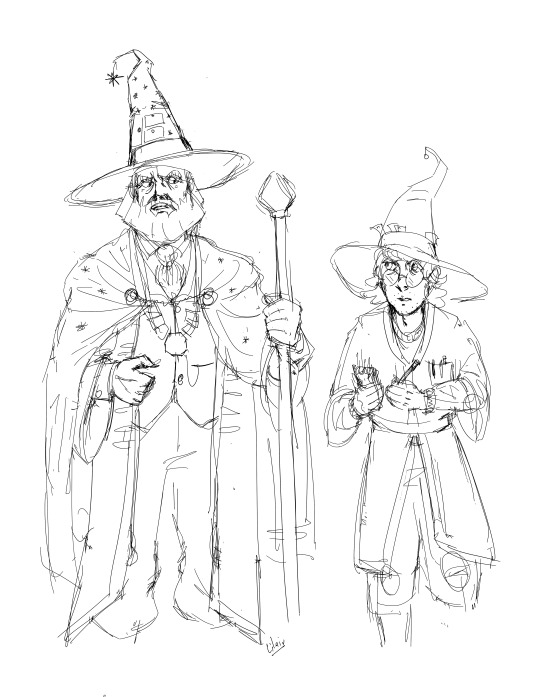
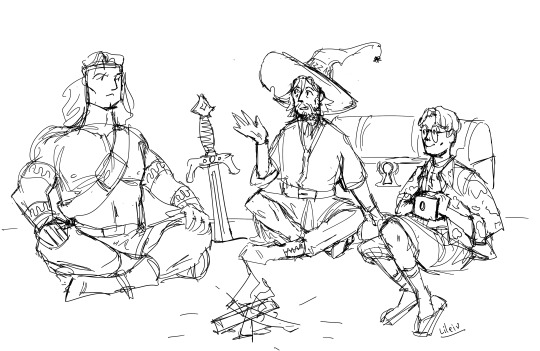
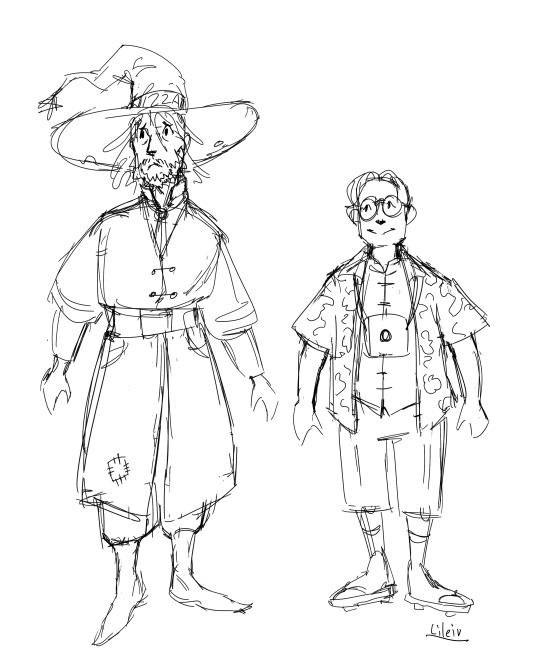
Assorted wizards and friends
337 notes
·
View notes
Text
People who believe that small children are proof that gender roles are natural are really on a whole other level.
A young child, using words she learned purely by mimicking the way others speak: I want to be a mommy when I grow up.
Y’all absolute Mensa candidates: Wow. This child is a blank slate. Completely unaffected by society. Guess lady-brains truly are the only explanation here, science deniers.
37K notes
·
View notes
Text
I think the moment that convinced me the operating logic of our society is truly fucked in a way that cannot merely be reformed was after that eclipse in 2017 when the articles started coming out about how much money had been lost by productivity dropping from people stopping momentarily to watch it happen. To measure the world by the metric of the dollar to such a devotion that any cult leader would be jealous of that you would look at one of the most sublime experiences in nature which we, our ancestors, and even a not insignificant number of non-human species, have been observing in awestruck wonder for millennia, and decide that such a moment of profundity is something to be fought and preferably expunged from the human experience because it briefly impacts quarterly revenue.
It's a feeling that has been coming up repeatedly, but with increasing frequency in the last few years. That being: what is all of this for? Where are we going? Nobody who defends the status quo can seem to answer it. What's the point of an uninterrupted quarterly revenue stream if we can't even look at an eclipse every few years? What's the point of hustling and grinding 50, 60, 70 hour weeks if you never have time to have dinner with your friends, talk to your family on the phone, but on a bigger spectrum, what's the point of all of that if you still don't have any way of retiring in the future? With the way that our lives are being increasingly monetized and squeezed every second, what is there to look forward to?
72K notes
·
View notes
